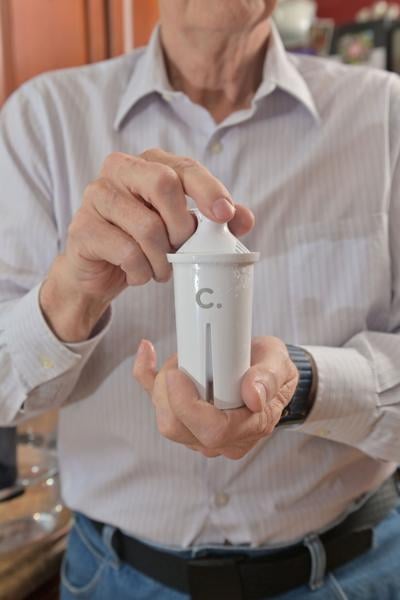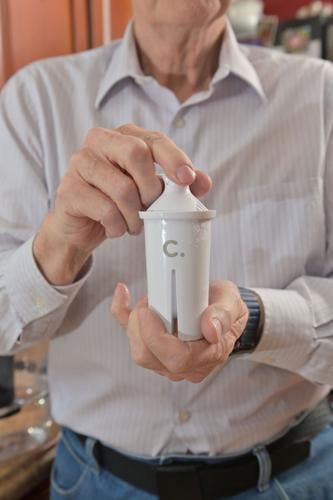THE ISSUE
“Exposure to forever chemicals, known as PFAS, can raise the risk of testicular, breast, kidney and liver cancer, and the first round of state-mandated testing has found elevated levels in 15 of Lancaster County’s 68 monitored drinking water systems,” LNP | LancasterOnline’s Elizabeth DeOrnellas reported last week. Those 15 systems test at or above the federal contaminant limit announced last Wednesday, “although no systems are out of compliance with current, less restrictive Pennsylvania regulations.” PFAS is an abbreviation for perfluoroalkyl and polyfluoroalkyl substances. Pennsylvania’s regulations focus on two PFAS: perfluorooctanoic acid and perfluorooctanesulfonic acid.
In Lancaster County, most of us — or, at least, those of us who don’t live in homes with lead pipes — take for granted the idea that our drinking water is safe. We refill our water bottles and cups several times a day from our home, workplace and school taps.
The reality is, though, that higher-than-acceptable levels of forever chemicals were detected in local water systems, including the following: City of Lancaster (which also serves Manheim Township), East Hempfield Water Authority, Elizabethtown Area Water, Millersville University, Upper Leacock Township, East Cocalico Township, Manheim Area Water & Sewer Authority, New Holland Borough, West Cocalico Township Water Authority, Terre Hill Borough and Pequea Valley Senior High School. (Ephrata Area Joint Authority’s level was just at the new federal limit for one chemical.)
Those drinking water systems with elevated levels of forever chemicals serve more than 226,000 county residents.
As the U.S. Environmental Protection Agency warns, there is no safe level of forever chemicals in drinking water — which is why a new federal rule lowers the legally enforceable limits on them.
And we’re glad it does.
The EPA’s tougher new standard will require the Pennsylvania Department of Environmental Protection to tighten its own regulations. We hope this means that, in turn, the water systems serving Lancaster County will work to keep these forever chemicals out of our drinking water, or at the very least reduce them.
While the chemicals can be hard to pronounce and understand — and the abbreviations used for them are nearly as indecipherable — this much is clear: They are linked to cancer. There are no treatments to remove them from our bodies once they’re ingested, according to Dr. Alan Peterson, emeritus director of environmental and community medicine at Penn Medicine Lancaster General Health. So we shouldn’t be ingesting them in the first place.
As DeOrnellas explained, PFAS are called forever chemicals because of how slowly they break down over time. They are human-made chemicals created to repel oil and water, and they’re commonly found in carpet and furniture treatments, waterproof clothing, nonstick cookware, firefighting foam and more.
PFAS-Exchange, a research initiative funded by the National Institute of Environmental Health Sciences, offers these suggestions to reduce exposure to these chemicals:
— Use an activated carbon or reverse-osmosis filtration system for your drinking water.
— Use cast iron, stainless steel, glass or enamel cookware instead of Teflon or other nonstick products.
— Use nylon or silk dental floss that is uncoated or coated in natural wax rather than glide floss.
— Avoid microwave popcorn, greasy foods wrapped in paper and takeout containers.
— Avoid stain-resistant carpets and upholstery and don’t use stain-resistant treatments or waterproofing sprays on carpets or furniture.
— Avoid personal care or beauty products with the ingredient PTFE or other “fluoro” ingredients.
Until products made with these forever chemicals are banned, consumers are going to have to be diligent in limiting their exposure to them. Which is no easy task.
Dr. Peterson told LNP | LancasterOnline that even practicing physicians and medical students still are learning how to deal with the health impacts of PFAS exposure. This is why preventive steps are imperative.
But what agency in Lancaster County is going to spearhead preventive efforts? Because we don’t have a county public health department.
This newspaper is doing its best to raise awareness about forever chemicals in drinking water by reporting on them, and the LNP | LancasterOnline Editorial Board believes it’s important to amplify that reporting.
But there ought to be a sustained public information campaign of the kind that only a county public health department could deliver. Safe drinking water is essential to the well-being of county residents. A county health department could help to ensure our water is safe.
Republican Lancaster County Commissioners Josh Parsons and Ray D’Agostino continue to insist that our county doesn’t need a public health department. Perhaps Democratic Commissioner Alice Yoder, who spent decades working in community health, can change their minds. She should try.
As DeOrnellas reported, doctors are advised to consider additional screenings for patients living in communities with contaminated water or other exposures to high levels of forever chemicals. But of the more than 226,000 county residents potentially being exposed to elevated levels of two forever chemicals, how many will get lab tests or cancer screenings or perhaps blood pressure monitoring during pregnancy? How many should? Would those screenings be covered by health insurance? To whom can county residents turn if they have difficulty obtaining screenings or have other concerns?
The Agency for Toxic Substances and Disease Registry, a federal public health agency under the U.S. Department of Health and Human Services, offers a tool (lanc.news/PFASestimateATSDR) to estimate PFAS levels in a person’s blood using data from tested tap water. But a blood test from a doctor is needed to confirm results.
Lancaster County residents may feel like they’re on their own when dealing with complex issues such as PFAS. Though experts recommend some measures to reduce their exposure, residents could use some local help.





